Pet mice are friendly, affectionate, active little pets. Small, easy companions they are entertaining and cute pets for any sized home. Today we’ll look at where and how to cage your pet mice. We’ll give you top tips for their diet, exercise and taming baby mice too. Pet mice are a great choice for gentle kids and adults alike.
Mice as pets need to be kept with one or more other mice, as they are very social animals. Younger mice need to grow up with other mice to develop less aggression, and good social skills. To keep them healthy and happy they will need a clean cage, mental and physical stimulation, food and water.
Contents
- Are mice good pets?
- Pet mouse temperament
- Are pet mice good with kids?
- Do pet mice bite?
- Are pet mice nocturnal?
- Do pet mice smell?
- What do pet mice eat?
- How long do pet mice live?
- Pet mouse care
- Cages, toys and exercise
- Baby mice
Let’s take a closer look at the various things our pet mice need to stay happy. Including answers to frequently asked questions about toys, social needs, and how long do pet mice live!
Are Mice Good Pets?
It’s difficult to determine what makes a good pet! Different animals will make good pets for different people – and you’ll realize that this depends on countless factors. Mice as pets are ideal if you want a companion but don’t have much space or a lot of time.
Mouse care is relatively easy. You just need to provide them with the right food and environment to keep them happy and healthy. Pet mice are active creatures that love to explore their cages and exercise lots. They need a clean cage with enough space and toys to keep them entertained.
Fancy mice, the ones you see in pet stores, were originally domestic house mice. However, they’ve been selectively bred for certain desirable characteristics. They’re often even entered in competitions.
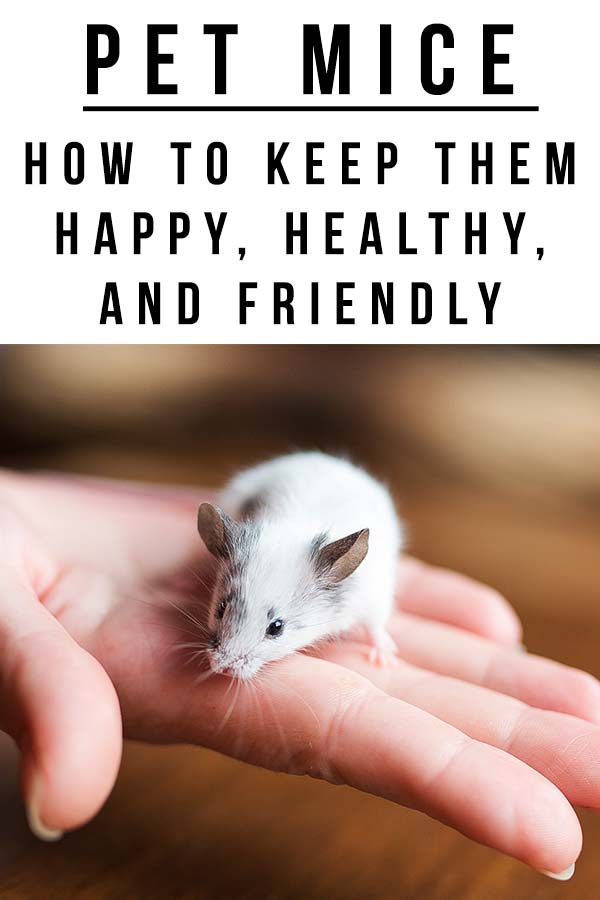
How Big do Mice Get?
From head to tail, adult mice will often be between 5 and 7 inches in length. So, mice as pets are still quite small! This means they’re great for older kids who want a pet they can handle and play with.
But, this small size means they are quite delicate. So, be careful when handling them and never let them fall from a big height. It’s important to learn everything you can about a pet mouse before buying one. So, let’s continue to see if this is a good pet for you.
Are Pet Mice Friendly?
Just like us, pet mice have different personalities. Your pet mouse might be naturally either more easily scared or more aggressive. But, most mice are friendly, social, and playful.
If you meet all of your pet mouse care needs, your mouse will be happy and comfortable in their home with you. You should handle your mouse regularly to ensure they aren’t scared of you or of being held.
Are Pet Mice Good with Kids?
Learning how to take care of a mouse can be a fun experience for families. But, a pet mouse is maybe not the best pet for a young child. Especially if you are looking for a pet that they can interact with all the time. They do make great pets for older children, who can also start taking responsibility for feeding their mice and keeping the cage clean.
Letting young children pick up a pet mouse is not recommended. It can be hard to control how gentle they are – especially as mice will move around quickly and likely try to escape being held. If kids are rough with pet mice when trying to interact with them, they could get bitten.
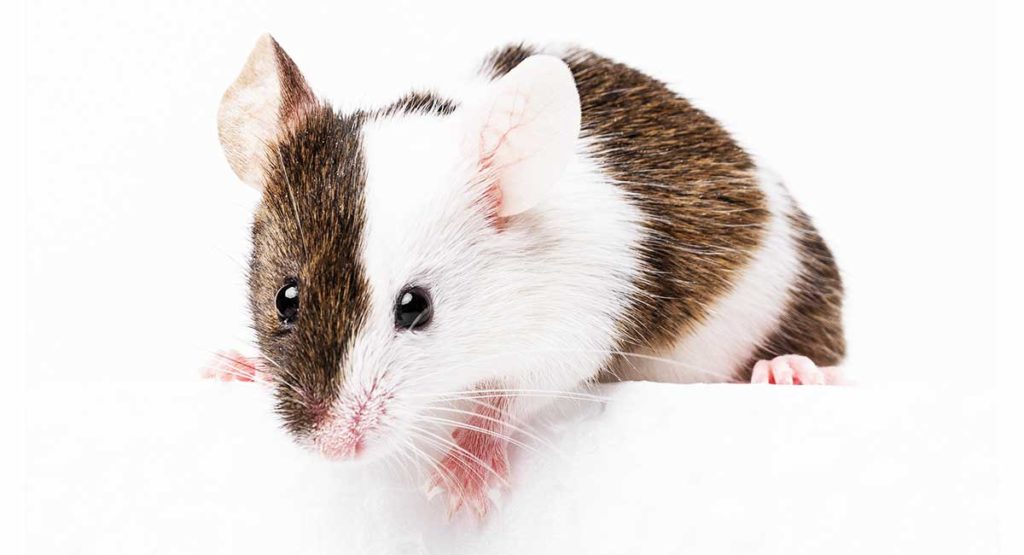
Playing With Pet Mice
This doesn’t mean you shouldn’t get pet mice if you have children. There are plenty of ways for young children to interact with these pets without having to pick them up. They can buy them fun new toys and watch them play. Also feed them treats from their hand, inside their cages.
Unfortunately, the sleeping patterns of mice can mean that your kids don’t actually get to see much of these little pets! But we will look at this a little closer in a moment.
Do Pet Mice Bite?
When handled regularly and gently, with flat palms rather than grabbing hands, most mice will keep their teeth to themselves. Pet mice mostly bite only when they’re frightened. Most people want pets that are going to be relatively gentle. You want to be able to handle or get close to your smaller pet without potentially hurting yourself.
Mice are very small and delicate pets that love to whiz around their cages. This can make it really hard to pick them up and very vulnerable to rough handling. Then if you do manage to pick them up, they can be easily frightened. They might bite and you could accidentally let go when they do.
Taming Pet Mice
Mice won’t go out of their way to bite you, but you should be aware of the risk when you do try to handle them. So you need to be extra gentle and very patient in the beginning.
Get them used to your voice first. Then to your hand in the cage, maybe feeding them a tidbit. Make sure they feel safe with you before you actually pick them up.
When you do pick up your pet mouse, always remember that mice are great escape artists. Hold them close to your body and over a soft surface. A mouse can easily get injured if they accidentally jump out of your hand.
Are Pet Mice Nocturnal?
It’s the age old question – are pet mice nocturnal? The answer is yes! Mice are nocturnal creatures. You should be prepared not to see much of your pet mouse during the main part of the day! Mice become more active during twilight and scoot around at night into the early hours of the morning.
This makes them great pets if you have a job that keeps you out of the house through the day! But, can be disappointing for kids who want to play with their pet in earlier hours.
Mice can be noisy at night when they’re scuttling around their cage or exercising, which can affect where you place your mouse cage! You’ll want to put it somewhere where your mice won’t keep you awake when you’re trying to sleep!
Do Pet Mice Smell?
Unfortunately, pet mice have been known to be relatively smelly. But, you can minimize this by learning how to take care of a mouse cage. Mice, especially males, like to mark their scent around their cages, as a way of communicating or establishing their own territory.
Some mice will smell stronger than others, and you might not have any scent problems with your pet mice. But if you do, there are a few ways to reduce the smells.
Make sure you’re cleaning and disinfecting the cage regularly. Besides avoiding the smells, unclean cages filled with dust and a heavy scent of ammonia in the air can also cause your mice to get sick.
Cleaning Out Pet Mice
You should also avoid cleaning too often – about once a week should prevent smells from becoming too strong. Too frequent cleaning will cause your mice to overcompensate with scent marking to make up for the loss of odors when you disinfect their cage!
After cleaning you should always try to replace some of the original scent in your mice’s cage. You can replace some of the bedding that’s not soiled, an old piece of cardboard or toy.
This older scent can also encourage your mice to use a single part of the cage as a toilet, thus reducing smells from litter. You can also purchase different deodorizers at pet stores, which can help if all this regular cleaning doesn’t help improve your mouse’s scent!
What Do Pet Mice Eat?
So the next thing you might want to know about mouse care is what to feed a pet mouse. What do they eat, anyway? One of the most important parts of how to take care of a mouse is a healthy, balanced diet. As omnivores, they eat a huge range of different foods, from plants and grains to insects!
For the healthiest pet mouse diet, you should feed your mice a commercial mouse food which supplies a good variety of different ingredients. To this you can add small amounts of fresh fruits and veggies. Some safe fruits and vegetables include: carrot, cauliflower, cucumber, dried banana and seedless apples.
You can also give occasional treats, like mealworms, peas, or even scrambled egg. All fresh food should be given in very small quantities to make sure it doesn’t end up rotting the cage. You should always introduce new foods gradually to avoid upsetting your mice’s stomachs.
Feeding Pet Mice
When feeding your mice, you might want to spread food around their cage. This will encourage their natural tendency to forage for food, and gives them a little more exercise at the same time. As with all living things you mice will need fresh water all the time.
The recommended option is a water bottle with a non-drip drinking tube that attaches to the side of the cage. It can’t be knocked over and is easy to clean and refill. Mice are generally very healthy pets if provided with the right environment and food. But like any living creature they can develop health issues.
Common Health Problems in Pet Mice
The most common mice health issues seen by vets are skin problems, respiratory infections, and tumors. You should watch out for mites, ticks, and lice on your mice’s fur and skin. Mice can also get the usual infections that can affect their skin, ears, and intestines.
They can also suffer from allergies. So take care when introducing new foods.
Mice can even catch colds. You should watch out for any unusual behaviors like sitting hunched up and not running around as usual. Also keep an eye out for sneezing, wheezing, and runny noses – these can be signs of breathing problems or infections.
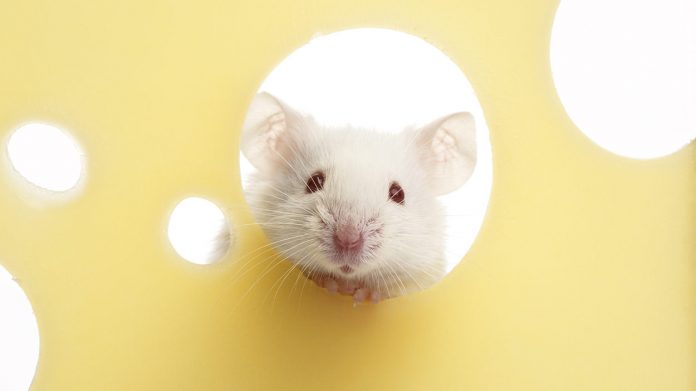
Pet Mouse Eyes, Teeth and Injuries
Mice are particularly prone to developing pneumonia from what starts out as a cold. And the chances of lung problems are increased if their cage is dirty. Dental problems are also quite common in mice because their teeth grow all the time. The teeth can cut into their gums, causing pain. Or they can easily break teeth that are too long when gnawing on hard objects.
You’ll want to watch for a condition called sticky eyes – which looks exactly like what it says. Sticky eyes can indicate an eye infection, allergies, or stress. As they get older mice also tend toward blindness.
Pet mice are also vulnerable to injury because of their size and delicate nature. If their cage is too small, you may see indications of “cage rage” – where the dominant mice attack the others. Your pet mouse is more likely to develop any of the more serious conditions as they get older.
Serious Health Problems
Serious conditions in pet mice include cysts, abscesses and tumors. Regularly feel for unusual lumps on your mouse, as these can signal tumors. When do you find unusual lumps, you’ll need a diagnosis from your vet. Abscesses can be treated with antibiotics.
Cysts and some tumors can be removed with surgery. Because mice are so tiny, internal tumours are difficult to treat. Other age related health problems in mice include kidney, liver and uterine conditions.
You should also watch for Wet Tail, so called because of a watery diarrhea causing the “wet tail. This is a serious intestinal infection in, especially young, rodents. It can be fatal within hours and requires a trip to the vet for antibiotics immediately.
If you notice anything unusual, you should always check with your vet.
How Long Do Pet Mice Live?
Healthy mice can live up to three years. This can make them seem a short-term pet compared to other animals, like dogs, but they’re still a big commitment!
This short-ish lifespan doesn’t mean you don’t need to put any effort into caring for your mice as pets. All pets deserve healthy, happy lives, and need appropriate and loving care!
Pet Mice Live In Groups
If you’re new to pet mice, you might be asking: can pet mice be kept alone? The answer here is no. If you are considering a pet mouse – be prepared to get at least two. Whether they’re in a pair, or a larger group, they need other mice to keep them company.
This is especially true when they’re younger, as growing up in with other mice affects their social behavior and aggression levels later in life! And this even includes how well they’ll socialize with you.
Studies have shown that being alone can be very stressful for mice. Stresses early on in life have been associated with the development of psychiatric and physical brain diseases in mice.
While this doesn’t necessarily affect whether or not mice make “good” pets, it can mean they require a little more work to care for, as you won’t be caring for just one! And don’t forget that a male and female together will breed with regular frequency!
Choosing a Cage for your Pet Mice
Choosing the cage itself will be your most important mouse care decision. Barred cages are a great choice for mice as pets, but you have to make sure that the bars aren’t spaced too far apart. Mice love to explore, so wide-spaced bars can create escape artists!
You should look for a cage with narrowly spaced bars. If your mice manage to squeeze through the bars of their cage, it can be incredibly hard to catch them, as they’re so fast.
Because you’ll be keeping multiple mice, you want to give them as much room as possible to avoid overcrowding. You also want to give them enough room to run around and get lots of exercise.
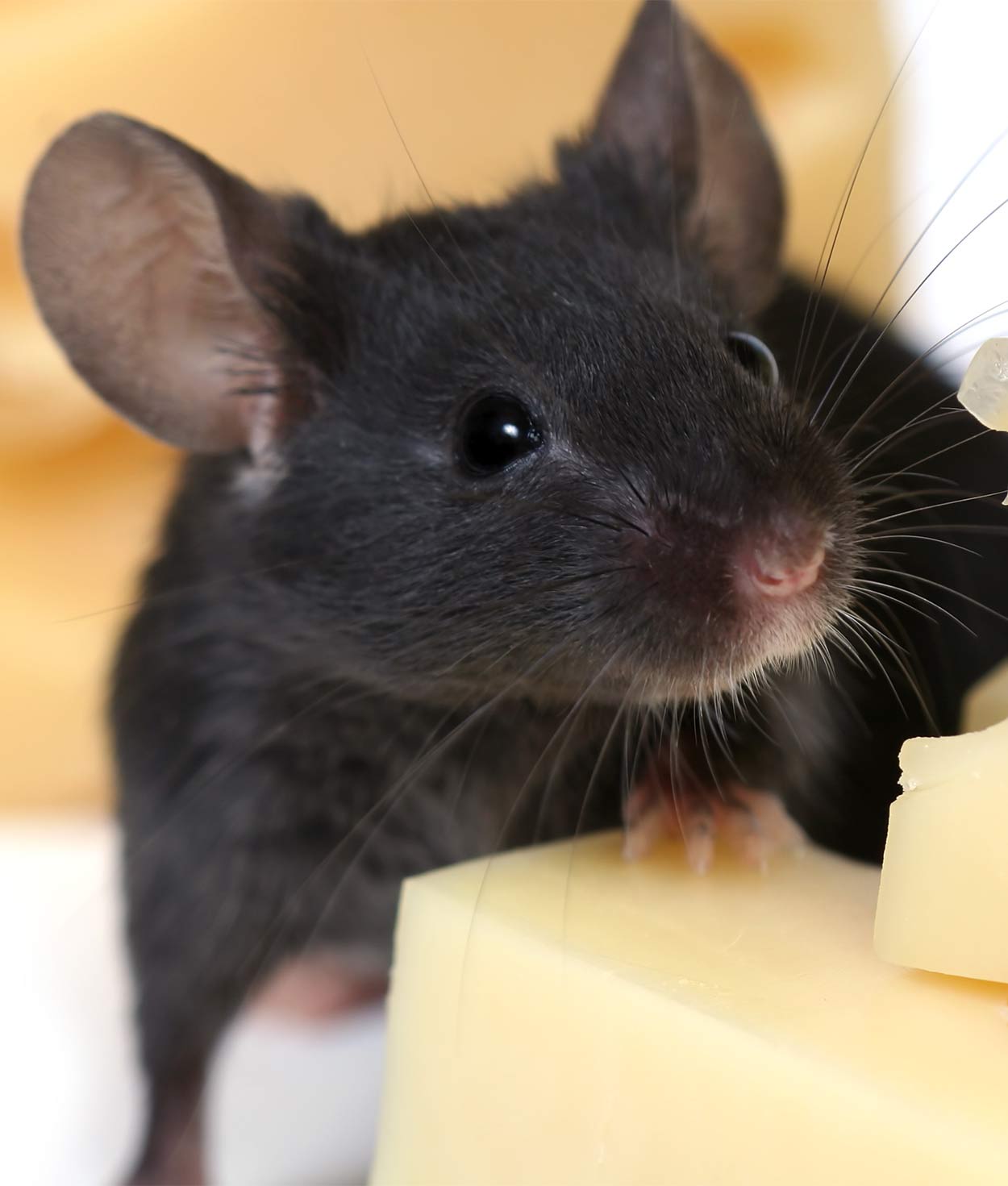
Wire Mouse Cages
Wired or barred cages are generally a better choice than glass or plastic cages for mice. They have great ventilation which helps to keep your mice healthy and fresh-smelling.
Besides a basic cage, you might want to spoil your pets with one of the fancier one’s on the market. These cages have different levels and activities, like tunnels and wheels already built in to provide your mice with lots of fun and entertainment.
For further guidance on how to select a cage for your pet mice have a look at our article Best Mouse Cage – Choosing the Right Home for Your Mice
Nesting Boxes for Pet Mice
You also need to provide your mice with a nesting box or two inside the cage. This cozy box is filled with shredded bedding for the mice to burrow in while they sleep during the day.
There are different nesting boxes available on the market, but you can also just use a ceramic flower pot. Cardboard boxes are also fine – but you’ll have to replace them often as they’ll get chewed up and shredded.
Furthermore, you need to provide you mice with toys in their cage. This keeps them healthy and fit and also from getting bored.
Toys for Pet Mice
An exercise wheel is an essential feature for caged mice. You should get a wheel that’s solid as the tiny mice can get their little legs hooked up and injured on the wire ones.
Some people believe that running on these wheels isn’t natural and that caged mice run on them because they’re stressed out. To test this view, researchers placed some wheels near the homes of wild mice and they took to jogging on them regularly.
If your cage doesn’t have built in play features you can buy toys like tunnels and ladders separately in most pet stores. Even an empty cardboard toilet roll or paper towel holders makes a great tunnel for your pet mice.
Mouse Chew Toys
Mice also like to chew a lot. In fact, they need to, because their teeth grow all the time. If you don’t provide chew toys they might end up gnawing on the cage wires and break their teeth or injure their little mouths.
There are lots of chew toys for mice available in pet shops. You can also provide simple items like cardboard, pumice stone, and natural softwood twigs. When it comes to twigs avoid cedar and pine, as many mice are allergic to these woods.
Where to Put Your Mouse Cage
Now, you have your great cage filled with fun toys, but finding the right place for it is the next step in how to care for a mouse.
Because mice are nocturnal creatures you’ll want to put their cage somewhere that would mimic their natural habitat. It should be quiet and unobtrusive through the day, but dark at night when they’re awake.
This is important because studies have found the exposure to bright lights at night can alter the behaviors and mental ability of mice! The cage should be in an area that’s well ventilated – we’ve already discussed the reason for this – but not exposed to cold draughts or direct sunlight.
Pet Mice Are Noisy
You should also place the cage in an area that isn’t too loud. Mice have much more sensitive hearing than we do. Certain sounds and vibrations can keep them awake, or even make them quite stressed.
Keeping them away from TVs and stereos is best. Also from computers and any other electrical equipment that emits continuous low-level sound. Then, of course, you need to provide fresh water and feed your mice daily.
Exercising Your Pet Mice
We’ve briefly discussed the exercise needs of our pet mice. But, let’s bring it all together here. Mice are very active. They need plenty of exercise each day.
Ideally, they will spend lots of time running in a wheel. But, they also love to climb. So, if you can get some fun toys or a multi-levelled cage, your mice will be super happy.
Remember, spreading their food around their cage rather than putting it all in a bowl can be a great way for mice to get some exercise by foraging.
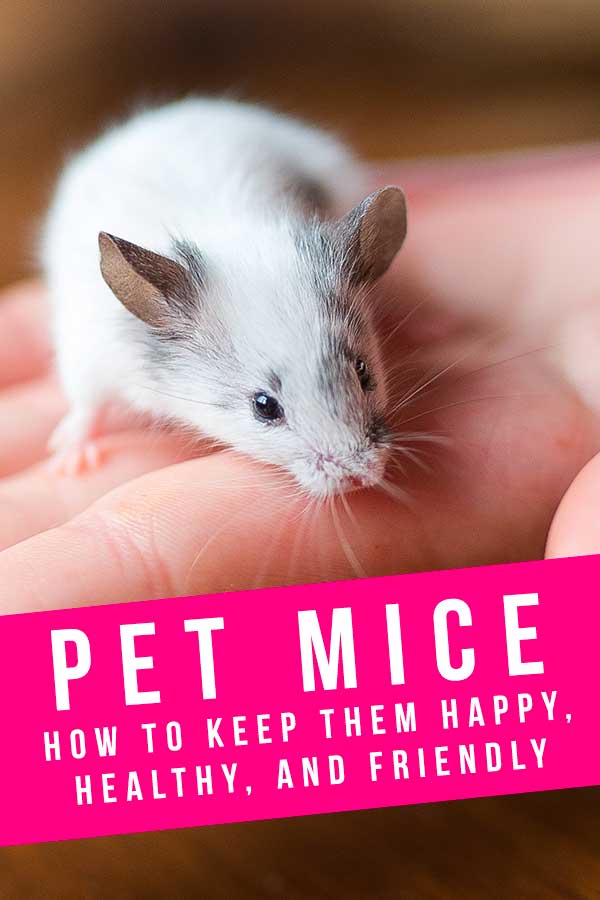
Pet Mice For Sale
When buying a mouse, you have three options: pet store, rescue center, or breeder. Pet stores may be the easiest for you. But, sometimes mice from pet stores can be less healthy and live shorter lives.
Rescue centers are a great choice, as not many people know about them, and mice can be given up like any other type of pet.
The best way to find a rescue center near you is by searching online or on social media. This is often the cheapest way of buying a mouse.
And finally, choosing a breeder can be a good way to ensure that your mice are as healthy as possible, and have certain characteristics you desire. You can find breeders local to you by looking on the websites of mouse clubs.
Fun Facts About Mice
Mice are cute, lovable animals! So let’s start off our guide by taking a look at some fun facts about them.
- The scientific name for mice is Mus musculus.
- Fancy mice come in all shapes, sizes and colours. You can get a pet mouse in white, brown, or even silver and black!
- Mice can have no pigment in their skin or fur at all!
- Just like us, mice are omnivores. This means they can eat very varied diets.
- Mice can communicate their moods and emotions through facial expressions.
- Many studies have suggested that mice can feel empathy!
Similar Pets
If you’ve decided that mice aren’t quite right for you, we have some guides to similar pets that may be better suited to your lifestyle.
- Rabbits
- Syrian Hamster
- Dwarf Hamsters
- Guinea Pigs
Your Pet Mice
Mice are pretty low-maintenance pets, but require plenty of exercise opportunities and a well-balanced diet. They also need regular cleaning to prevent strong smells.
As nocturnal animals, mice will be most active at night and sleep through the day, so are great for people who work in the day.
Mice aren’t always the best choice as a pet for young children. They don’t necessarily like being handled, and could bite when picked up if they feel at all frightened.
But if you think a nocturnal, cute, low-maintenance pet is right for you, mice are a great choice!
What Do You Think?
Do your kids love pet mice, even though they sleep all day? Do you have any tips for fixing smelly mice? Tell us about your experiences with pet mice in the comments section below.
Find Out More About Pet Mice
- Albino mice
- Baby mice
- Can mice climb trees?
- Mouse lifespan
- Can mice swim?
- Mouse cages
- Mouse Names
Readers Also Liked
- Can Mice Swim?
- Gerbil Lifespan
- How Long Do Mice Live?
- Do Rabbits Hibernate?
- Baby Chicken
References and Resources
- Branchi et al. ‘Early Social Enrichment Shapes Social Behavior and Nerve Growth Factor and Brain-Derived Neurotrophic Factor Levels in the Adult Mouse Brain’, Biological Psychiatry (2006)
- Datta et al. ‘Gender Features and Estrous Cycle Variations of Nocturnal Behavior of Mice After a Single Exposure to Light at Night’, Physiological Behaviors (2016)
- Donnelly, T. ‘Mice and Rats as Pets’, MSD Veterinary Manual (2015)
- ’Wild Mice Run for Fun on Wheels’, Nature (2014)
- Hess, L. & Axelson, R. ‘Diseases in Rodents’, VCA (2019)
- PDSA
- Ros-Simo, C. & Valverde, O. ‘Early-Life Social Experiences in Mice Affect Emotional Behavior and Hypothalamic-Pituitary-Adrenal Axis Function’, Pharmacology, Biochemistry, and Behavior (2012)
- Dolensek et al. ‘Facial Expressions of Emotion States and their Neuronal Correlates in Mice’, Science (2020)
- Sanders et al. ‘Empathic Fear Responses in Mice are Triggered by Recognition of a Shared Experience’, PLoS One (2013)

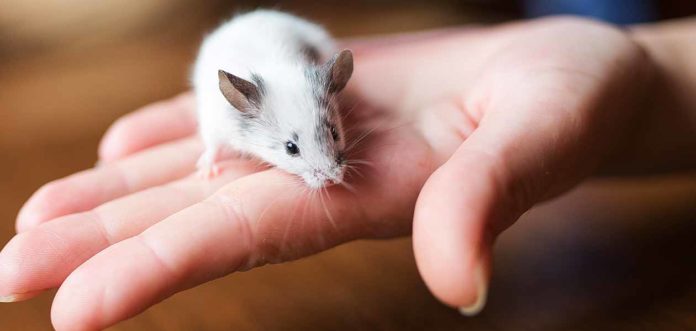














I have five rescued deer mice. My first, Dickens, I rescued as an infant. He stores all the food I feed him in his spaceship. Some is two years old. Can I empty it and give him fresh food to transport into this winter stash area, or will it stress him out? Please respond as soon as possible. Thanks – Leslie
Hi, I rescued deer mice too. I then feed them peanut butter and baking soda. Then bbq them with a flamethrower.
thank you for helping me it means a lot to me! i bet my mouse will be happy!